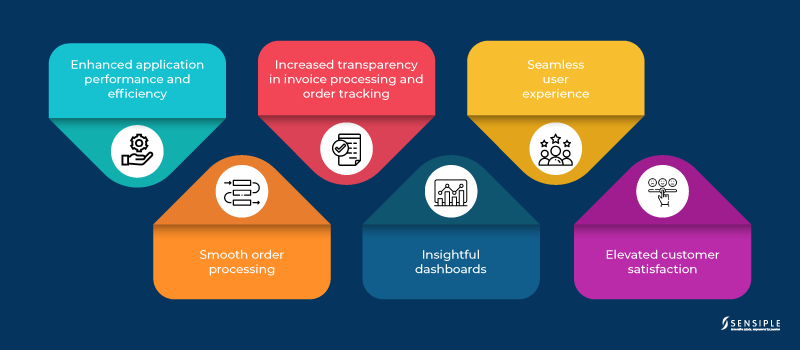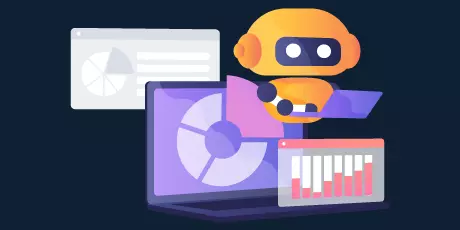
Accelerating Innovation with Google Cloud: Empowering Application Modernization
In an era of rapid technological advancements, the manufacturing sector has been undergoing a profound transformation. Traditional approaches are being challenged by the emergence of innovative solutions and digital technologies that are revolutionizing every aspect of production. In this context, Google Cloud application modernization plays a crucial role in helping manufacturers observe improvements in productivity, reductions in downtime, and better usage of resources.
Modernizing applications helps manufacturers reduce the efforts and cost of maintaining a suite of on-premises legacy applications, use more detailed data for effective inventory and production control, and monitor equipment to maintain and reduce downtime.
Join us as we uncover the significance of modernizing applications in the manufacturing industry and discover how it drives efficiency, productivity, and overall success in this dynamic landscape.
The Business Impacts of Modernizing Manufacturing Applications

Benefits of Google Cloud Application Modernization in Manufacturing
Below are the key advantages of application modernization in the manufacturing sector:
- Streamlined data collection: In today's business landscape, data has become an indispensable resource. Companies are increasingly dependent on data, and digital transformation plays a crucial role in facilitating the centralized storage of this valuable information. This centralized approach enables businesses to automatically gather data and generate comprehensive reports. Consequently, manufacturers can leverage these insights to optimize their production processes and achieve their desired business objectives by closely monitoring key performance indicators (KPIs).
- Predictive maintenance: Manufacturers are leveraging the power of smart sensors to gather data directly from their machines and equipment. By utilizing these sensors, they can proactively predict potential issues and implement predictive maintenance strategies. This approach helps to minimize downtime by addressing problems before they escalate, ultimately leading to improved operational efficiency and reduced disruptions.
- Reduction of expenses: Advancements in the manufacturing industry have facilitated real-time data access for companies regarding their production processes and supply chain operations. This capability enables companies to monitor inventory levels, gain insights into demand cycles, and stay updated on delivery statuses. As a result, they can exercise more precise control over production volumes, leading to enhanced efficiency in meeting market demands.
- Efficient workforce management: Incorporating software modernization in the manufacturing business entails streamlining production processes. By providing workers with access to data from various platforms, they are empowered to allocate responsibilities effectively and foster improved collaboration. Furthermore, this modernization enables companies to accomplish projects with fewer staff members, maximizing operational efficiency and resource utilization.
Essential Factors to Evaluate When Modernizing Your Manufacturing Applications
- Ensure a Unified Digital Ecosystem - Effective real-time collaboration is crucial for ensuring reliable plant operations. However, the presence of data silos, typically caused by legacy systems like on-premises maintenance management applications, poses a challenge to establishing seamless real-time collaboration.
To overcome this hurdle, it is important to select a cloud-native solution that seamlessly integrates with your unified digital ecosystem when modernizing these applications. [Note: In case you don't have a digital ecosystem in place, it is advisable to opt for a platform that enables you to create one.] - Prioritize Human-centricity in application - Emphasize the importance of human experience as a top priority. Many legacy applications, despite being digital, still rely on manual efforts, often resulting in increased mouse clicks instead of streamlining processes.
To address this, it is advisable to implement AI-powered applications that automate various tasks. By leveraging AI-powered automation, valuable work hours are saved, and the risk of human errors is significantly reduced. This enables employees to concentrate on tasks that truly require human attention and intelligence. As a result, employee morale is boosted, and a healthier workplace environment is fostered. - Accelerate data-driven decision making - In the data-driven industrial landscape, digital applications serve a vital role beyond process execution. They should provide actionable insights into process performance. When choosing a solution, consider one that offers a dashboard or integrates seamlessly with a data analytics platform within your unified digital ecosystem. This enables effective measurement and evaluation of process performance.
- Overcome change resistance - During the process of application modernization, it is common to encounter resistance to change from your workforce. This resistance is particularly prevalent in manufacturing plants when introducing new digital applications.
To address this challenge, consider forming fusion teams consisting of both software developers and business teams. Leveraging no-code/low-code platforms like Microsoft Power Platform, your operations teams can quickly build applications, sometimes even within a single day. This approach promotes collaboration and empowers non-technical teams to actively participate in the application development process. - Generate Justifiable ROI - The development and upkeep of applications can be expensive. Studies indicate that application maintenance typically accounts for 15-20% of the average development cost. To ensure cost-effectiveness and long-term resilience, it is important to make strategic digital investments that deliver sustainable results and robust processes. Additionally, these investments should generate a justifiable return on investment (ROI). Consider leveraging technologies that enable the construction and maintenance of applications at a lower cost, helping to optimize expenses while still achieving desired outcomes.
Challenges of Modernizing Applications in the Manufacturing Industry
Manufacturing companies that want to scale up operations might face various challenges to generate quality leads, increase revenue, and provide continuous maintenance. When looking to invest in manufacturing application modernization, businesses might often need help choosing appropriate software solutions and upgrading their existing programs through modernization.
To streamline the selection process among the numerous software solutions available on the market, it is advisable to focus on options specifically tailored to your industry. Opting for a customizable program can offer a more cost-efficient solution that can be tailored to meet your unique requirements.
If unsure about the most suitable software, one approach is to install a trial version and assess its ability to handle large volumes of data effectively. It is crucial that the data presented is clear and facilitates a comprehensive understanding of the development processes, making it easier to implement new ideas.
Modernize Your Applications with Sensiple
If you're looking to revitalize your manufacturing business by modernizing your applications, we can help you prioritize and achieve higher ROI through our application modernization solutions on Google Cloud.
At Sensiple, we specialize in developing custom software tailored to meet your specific needs. Our goal is to enhance performance, increase employee efficiency, mitigate the risk of human errors, and ensure compliance with the latest safety and performance regulations.
Our comprehensive approach to application modernization guarantees faster innovation through consistent development, operational expertise, and access to industry-leading tools and guidance—all while reducing costs.
Seek our professional assistance in navigating the challenges of modernizing your manufacturing software. Reach out to our dedicated team at info@sensiple.com.


